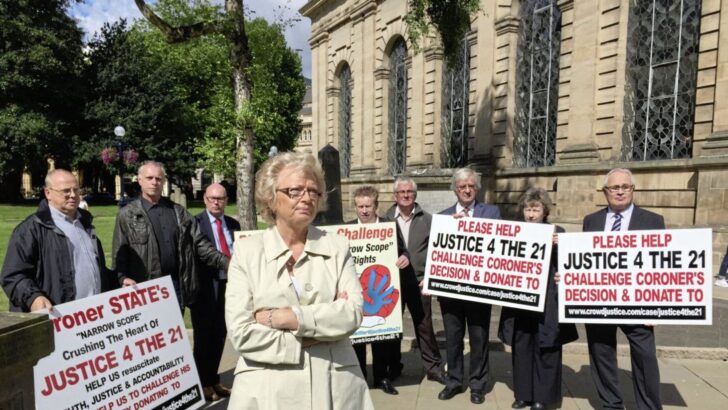Years ago, I had a certain amount of sympathy for Provisional Sinn Féin/IRA. I even defended some of their tactics on the – now I think stupid and wicked – revolutionary principle that “you can’t make an omelette without breaking eggs”.
I felt the Catholic nationalist people of Northern Ireland had suffered long injustices: maybe they had to fight for change.
Impact
But I remember exactly the moment when the full horror of “the armed struggle”, and its appalling strategy, struck home to me. It was 50 years ago, on November 21, 1974, with the news of the Birmingham bombings.
It was the ordinariness of that evening, with young people gathered together harmlessly for an after-work drink, that was so compelling. When the blasts came, at the Mulberry Bush and the Talk of the Town, 21 people lost their lives, and nearly 200 were injured.
And many of the victims were themselves Irish, since Birmingham has always had a strong Irish community. Two brothers, Desmond and Eugene Reilly, aged 21 and 23, who had met to share a pint together, were instantly killed. Imagine the grief of their mother: losing both her sons. This struck me as wantonly cruel.
Certain events often have an impact on us for a reason: we are open, at a particular moment, to examining our conscience more rigorously. And I think I was awakened to the horror of taking human life because I had just recently given birth to a baby. How precious life was, emblemised by that infant in the cradle: and how wrong to destroy it wilfully and heedlessly.
Apart from the tragedy of lost lives, there was an awful impact on the Irish community, and then the injustice of the Birmingham Six who were wrongly imprisoned for the crime. The IRA never admitted responsibility, but IRA operatives have been identified as having carried out the atrocity (Michael Murray, who died in 1999, has been one publicly named).
Over the years, as we know, there have been many atrocities, including the Dublin and Monaghan bombs, and the terrible events at Omagh. For each of us, there has perhaps been one event that really brought home to us how heinous it is to cause innocent civilians to perish. Many members of the clergy have upheld that message and preached it constantly.
In 2018, I travelled to Birmingham for an Irish Embassy reception at the Conservative conference there. Julie Hambledon was holding a public vigil for her late sister, Maxine, who had died, aged 18, in the Birmingham bombs. Her organisation ‘Justice4the21’ was still campaigning to find and charge those involved with planting the bombs. I walked over and put a tenner in her collection box.
Succumbing to modern consumerism
The Isle of Lewis, in the Outer Hebrides, has finally succumbed to modern consumerism, by allowing, for the first time in its history, Sunday trading.
The fiercely strict “Wee Frees” in Lewis have succumbed to the inducements of Tesco supermarkets, which opened their doors in Stornaway to islanders shopping last Sunday. Two thousand islanders signed a petition to oppose the move, but shoppers duly turned up at noon, just the same. Thus passes a Sabbatarian tradition which, in its more extreme form could be joyless and mean-spirited. Yet applied in moderation, the notion that there should be one day of the week for spiritual reflection, and not dedicated to trading and consumerism, is quite sane.
I had an aunt who came from a Tipperary Protestant background, and although she became a Catholic, she wouldn’t shop on a Sunday. She could also never quite shake off a feeling of guilt if she indulged in a card-game on the Sabbath.
***
I wrote recently about attending a traditional Latin Mass in France, and I’m flattered to hear I was quoted from the pulpit in Cork. I have now received a short booklet, sent anonymously to enlighten me further, called Dispelling Confusion: A respectful Plea for the continuing of Harmonious Unity of Legitimate Diversity in Ritual Practice of the Sacred Liturgy. (Published by ICHTHUS – Catholic Apostolates International.)
I dislike Church quarrels and I wouldn’t want to enter into arguments around this issue, or why Benedict XVI (traditionalist) was right and Pope Francis (modernist) is wrong. But there is an interesting chapter on why so many young people seem drawn to the Latin Mass: in a confusing world they seek the awe and spiritual nourishment they may find in the Usus Antiquior. There can be an experience of “total immersion” in the traditional form.
And the Novus Ordo – the modern form – can contain too much “jumping up and down”, as I’ve heard it described: stand, kneel, stand again, sit, stand. There’s something to be said for restfulness and contemplation.
I’m not a partisan for one side or the other: but open to listening to both.


 Mary Kenny
Mary Kenny